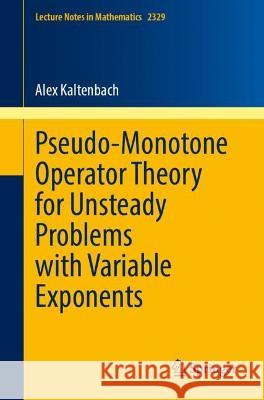Pseudo-Monotone Operator Theory for Unsteady Problems with Variable Exponents » książka
Pseudo-Monotone Operator Theory for Unsteady Problems with Variable Exponents
ISBN-13: 9783031296697 / Angielski
This book provides a comprehensive analysis of the existence of weak solutions of unsteady problems with variable exponents. The central motivation is the weak solvability of the unsteady p(.,.)-Navier–Stokes equations describing the motion of an incompressible electro-rheological fluid. Due to the variable dependence of the power-law index p(.,.) in this system, the classical weak existence analysis based on the pseudo-monotone operator theory in the framework of Bochner–Lebesgue spaces is not applicable. As a substitute for Bochner–Lebesgue spaces, variable Bochner–Lebesgue spaces are introduced and analyzed. In the mathematical framework of this substitute, the theory of pseudo-monotone operators is extended to unsteady problems with variable exponents, leading to the weak solvability of the unsteady p(.,.)-Navier–Stokes equations under general assumptions.Aimed primarily at graduate readers, the book develops the material step-by-step, starting with the basics of PDE theory and non-linear functional analysis. The concise introductions at the beginning of each chapter, together with illustrative examples, graphics, detailed derivations of all results and a short summary of the functional analytic prerequisites, will ease newcomers into the subject.
This book provides a comprehensive analysis of the existence of weak solutions of unsteady problems with variable exponents. The central motivation is the weak solvability of the unsteady p(.,.)-Navier–Stokes equations describing the motion of an incompressible electro-rheological fluid. Due to the variable dependence of the power-law index p(.,.) in this system, the classical weak existence analysis based on the pseudo-monotone operator theory in the framework of Bochner–Lebesgue spaces is not applicable. As a substitute for Bochner–Lebesgue spaces, variable Bochner–Lebesgue spaces are introduced and analyzed. In the mathematical framework of this substitute, the theory of pseudo-monotone operators is extended to unsteady problems with variable exponents, leading to the weak solvability of the unsteady p(.,.)-Navier–Stokes equations under general assumptions.Aimed primarily at graduate readers, the book develops the material step-by-step, starting with the basics of PDE theory and non-linear functional analysis. The concise introductions at the beginning of each chapter, together with illustrative examples, graphics, detailed derivations of all results and a short summary of the functional analytic prerequisites, will ease newcomers into the subject.











